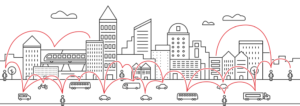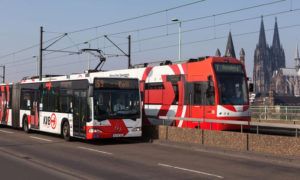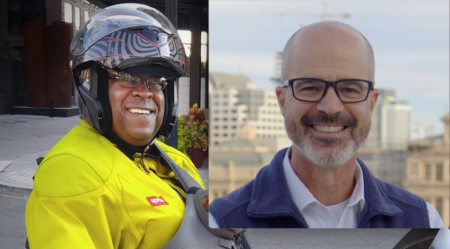As it prepares for a future of sustainable transport, the German city of Cologne has been examining new travel concepts such as Mobility-as-a-Service (MaaS), so it commissioned Ford and PTV to study the potential of new ride-sharing services.
The City of Cologne expects further population growth and increasing commuter flows in the near future and will therefore face numerous challenges such as overcrowded streets, rising levels of fine particulate matter (PM) and CO2 emissions. The city authorities contracted the Ford Research and Innovation Center and transportation software specialist PTV Group to analyze the potential and effects of new ride-sharing services on its existing transport systems. The city needed to know if new MaaS services, such as car-sharing and ride-pooling, would be a useful addition to its current transport ecosystem. The aim of the study was to examine different mobility scenarios and evaluate the operational performance of MaaS concepts, as well as their impact on infrastructure and the environment. 
Based on PTV software, the researchers developed a transport model, visualizing the current situation in Cologne. The project team analyzed an inner-city reference area and merged data on the general traffic volume with information on the transport zones, including public transport data provided by the region’s two transit authorities, KVB (Kölner Verkehrsbetriebe) and VRS (Verkehrsverbund Rhein-Sieg). It was thus possible to create a precise picture of where people started their journeys and which destination they traveled to. In addition, the researchers identified 2,800 locations suitable for pick-up and drop-off points. Various conceivable scenarios were simulated, such as if 3%, 60% or even 100% of Cologne’s motorized private transport was replaced by ride-sharing.
 The key findings of the study include:
The key findings of the study include:
- In order to ensure 3% change to ride–sharing throughout the city center, Cologne would need 300 vehicles that serve an average of 1.62 passengers per trip, with each vehicle carrying around 130 passengers per day;
- In this scenario, an additional journey time of less than 10 minutes would be required compared to a trip by car. However, there are no significant effects on transport and the environment in the 3% ride–sharing scenario;
- In a scenario where motorized private transport is completely replaced by ride-sharing and public transport, CO2 emissions would be reduced by 31% and NOx by 92%. As a result, only 8.1% of the current passenger cars registered in Cologne would still be needed.
 “In order to be able to shape future mobility in a sustainable way, it is important to know and understand the full range of relevant effects that these new services might have on transport and the environment,” said Dirk Franke from PTV, which has already conducted similar analyses for Lisbon, Oslo, Stuttgart and Zurich. “The study provides Cologne with an excellent basis for discussion and decision making in order to set the course for new, sustainable Mobility-as-a-Service offerings.”
“In order to be able to shape future mobility in a sustainable way, it is important to know and understand the full range of relevant effects that these new services might have on transport and the environment,” said Dirk Franke from PTV, which has already conducted similar analyses for Lisbon, Oslo, Stuttgart and Zurich. “The study provides Cologne with an excellent basis for discussion and decision making in order to set the course for new, sustainable Mobility-as-a-Service offerings.”
Ford Research’s, Detlef Kuck, said, “Simply shifting motorized private transport to public transport will not solve the city’s traffic and transport problems, as many local public transport lines are already overloaded and cannot be easily expanded.” 





